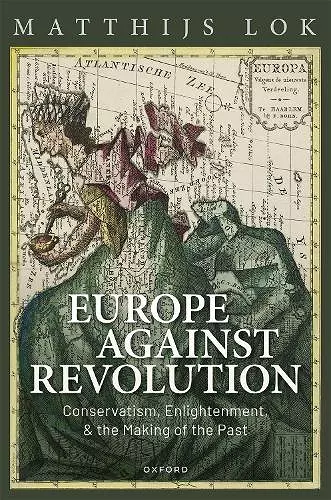Europe against Revolution
Conservatism, Enlightenment, and the Making of the Past
Format:Hardback
Publisher:Oxford University Press
Published:23rd Mar '23
Currently unavailable, and unfortunately no date known when it will be back

Contemporary Europe seems to be divided between progressive cosmopolitans sympathetic to the European Union and the ideals of the Enlightenment, and counter-enlightened conservative nationalists extolling the virtues of homelands threatened by globalised elites and mass migration. This study seeks to uncover the roots of historically informed ideas of Europe, while at the same time underlining the fundamental differences between the writings of the older counter-revolutionary Europeanists and their self-appointed successors and detractors in the twenty-first century. In the decades around 1800, the era of the French Revolution, counter-revolutionary authors from all over Europe defended European civilisation against the onslaught of nationalist revolutionaries, bent on the destruction of the existing order, or so they believed. In opposition to the new revolutionary world of universal and abstract principles, the counter-revolutionary publicists proclaimed the concept of a gradually developing European society and political order, founded on a set of historical and - ultimately divine - institutions that had guaranteed Europe's unique freedom, moderation, diversity, and progress since the fall of the Roman Empire. These counter-revolutionary Europeanists drew on the cosmopolitan Enlightenment and simultaneously criticized its alleged revolutionary legacy. Throughout the nineteenth and twentieth centuries, these ideas of European history and civilisation were rediscovered and adapted to new political contexts, shaping in manifold ways our contested idea of European history and memory until today.
In Europe Against Revolution, Matthijs Lok makes a nuanced and persuasive case for the role and significance of historical interpretations of a common Europe for a varied cast of counter-revolutionaries in the period between 1789 and the years that immediately followed the Congress of Vienna. History provided both a form and a framework for the expression of variously styled conservative or counter-revolutionary thought, whether German, French, Dutch, or British-indeed, the wealth of sources in multiple languages is one of the strengths of the book. * Emily Jones, History: Reviews of New Books *
Lok's book .... constitutes an important work, destined to mark a landmark in European history studies, which until today have mostly insisted on the tradition linked to the importance of 1789. * Antonino De Francesco, Austrian History Yearbook *
Matthijs Lok's new book makes a scholarly and damning case against the presentism of the chattering classes. While the book resists explicit prescriptive claims, its construction and conception indicate an interest in the deconstruction of contemporary political semantics, as well as a truer articulation of the radical, liberal, and conservative strains of thought. * Matthew Gasda, The New Criterion *
Lok convincingly shows that the often difficult to interpret sources are worth studying and that counter-revolutionary publicists were by no means the uninteresting reactionaries they were so often have been taken for (...). Anyone who completes the reading of Lok's highly original work will be deeply impressed by the intellectual depth of the analysis offered. * Wyger Velema, Tijdschrift voor Geschiedenis *
The main aim of the book is to excavate a forgotten genealogy of the history of Europe as a cultural and political region, derived not from the liberatory promises of the French Revolution but from counter-Enlightenment scholars who opposed the Revolution and its legacies (...) The book challenges conventional historical narratives of the development of both nationalism and cosmopolitanism in Europe. (...) I know of no other monographic study that treats both the French and German counter-revolutionary historians within the same frame. For all these reasons, the book is original and significant, both analytically and synthetically * Darrin McMahon, Dartmouth College USA *
This knowledgeable and carefully developed presentation of "historical Europeanism" (...) makes a contribution to the history of European historiography that is well worth reading. The nineteenth century, usually researched as an age of national historiographies, appears in a unusual light. * Bernd Klesmann, Historische Zeitschrift *
M. Lok's book offers a rich and stimulating analysis. It provides food for thought for those interested in counter-revolutionary thought and the European idea, of course, but also more broadly in the cosmopolitan and transnational dynamics of European intellectual life at the turn of the eighteenth and nineteenth centuries. * Simon Sarlin, Le carnet du mouvement social *
If there is one thing for which Lok's book may be praised, it is the originality of much of the material and of many of the subjects it treats. This is the first general history of conservative Europeanism, as well as one of the first to put Europeanism forward as a post-revolutionary and émigré sensibility. (...) Indeed Lok deserves merit and scholarly gratitude for having opened up nothing less than a new field of study, and for having rescued from oblivion sophisticated and compelling intellectual figures whose thought represented and influenced the development of the European identity. * Carolina Armenteros, Erudition and the Republic of Letters *
Matthijs Lok's brilliant book, Europe against Revolution, fundamentally transforms our understanding of the intellectual legacy of the representatives of the counterrevolution in early nineteenth-century Europe. * Monika Baár, American Historical Review *
ISBN: 9780198872139
Dimensions: 240mm x 165mm x 25mm
Weight: 720g
378 pages